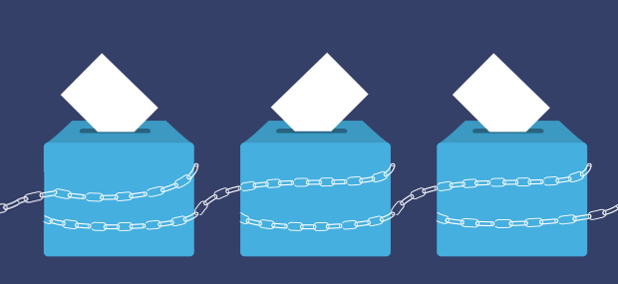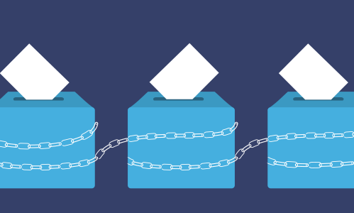Illinois outlines election security strategy
After suffering one of the most high-profile election attacks in 2016, state and local officials met with federal lawmakers to discuss plans for 2020.
What's driving government tech strategy
The synergy between policy goals, business needs and digital transformation is crucial to governments' ability to optimize the services they offer.
Think your agency doesn’t have industrial IoT? Think again.
Building automation systems relying on internet-of-things technologies open entry points for malicious actors to attack other mission-critical networks.
What airports can teach us about API security
Similar to how airport security depends on concourse design constraints, access control mechanisms and constant monitoring, agencies can minimize API attack surfaces through restrictive design and machine-learning based monitoring.
Bug bounty challenge surfaces DOD proxy weaknesses
Over a two-week period, white-hat hackers scoured hundreds of public-facing DOD Information Network proxy servers, virtual private networks and virtual desktops to find and disclose vulnerabilities.
DISA seeks military-wide identity management
The Defense Information Systems Agency is looking for vendors to establish a federated identity service that will allow it to centrally manage identity, credential and access management across DOD.
Mitigating mobile supply chain threats in a post-perimeter world
Security teams must obtain visibility into every app and establish a zero-trust access model for each endpoint in a way that doesn’t compromise user privacy.
Poor cyber hygiene haunts software supply chain
Rudimentary, easily exploitable software vulnerabilities are the most common ways bad actors get into systems and networks, a national security expert says.
Hacking for the public good
Information security research and hacking are creating positive developments for the public and private sectors.
3 ways DOD can plug security holes
Threat identification, continuous monitoring and security training will help the Defense Department mitigate its cybersecurity vulnerabilities.
Digital transformation requires a modern approach to cybersecurity
Agencies working toward digital transformation and cloud migration should focus less on protecting themselves with infrastructure and more on securing their users and how they interact with data.
Hackers try to access West Virginia's mobile voting app
Someone tried to hack into the state's blockchain-enabled mobile voting system during the 2018 election cycle.
Would a cyber playbook reduce risk?
A House bill proposes the Department of Homeland Security open its stores of technical guidance on cybersecurity mitigation to other federal agencies and the broader public.
No-surprise attack: Creating a database for online incursions
Building a knowledge base of adversary tactics and techniques based on the MITRE ATT&CK framework can greatly improve organizations' preparedness and breach response.
Preventing ransomware attacks with zero trust
Zero trust acknowledges the inherent risks posed by human error -- and offers a specific and fixed solution.
How an IoT botnet could disrupt the grid
A spike in demand for power caused by a coordinated attack on high-wattage internet-of-things devices could trigger transmission line failures and blackouts, but researchers at Princeton have a solution.
Shaving time off Real ID applications
The Real ID Pre-Screening tool vets documents residents need when they apply for a Real ID-compliant driver’s license and passes the data to participating DMV offices.
3 keys to dominating and protecting the connected battlefield
As DOD modernizes tactical communications, cybersecurity must remain at the forefront of planning and execution.
A 5G future without Huawei?
A slower, consensus-based approach to 5G development would be a better option than adopting low-cost, available technology from Huawei, three former top Department of Homeland Security officials said.
Elections can't be secured by funding alone
The Senate's approval of $250 million in funding to states to secure voting infrastructure ahead of 2020 will not be enough, experts say.

Do Not Sell My Personal Information
When you visit our website, we store cookies on your browser to collect information. The information collected might relate to you, your preferences or your device, and is mostly used to make the site work as you expect it to and to provide a more personalized web experience. However, you can choose not to allow certain types of cookies, which may impact your experience of the site and the services we are able to offer. Click on the different category headings to find out more and change our default settings according to your preference. You cannot opt-out of our First Party Strictly Necessary Cookies as they are deployed in order to ensure the proper functioning of our website (such as prompting the cookie banner and remembering your settings, to log into your account, to redirect you when you log out, etc.). For more information about the First and Third Party Cookies used please follow this link.
Manage Consent Preferences
Strictly Necessary Cookies - Always Active
We do not allow you to opt-out of our certain cookies, as they are necessary to ensure the proper functioning of our website (such as prompting our cookie banner and remembering your privacy choices) and/or to monitor site performance. These cookies are not used in a way that constitutes a “sale” of your data under the CCPA. You can set your browser to block or alert you about these cookies, but some parts of the site will not work as intended if you do so. You can usually find these settings in the Options or Preferences menu of your browser. Visit www.allaboutcookies.org to learn more.
Sale of Personal Data, Targeting & Social Media Cookies
Under the California Consumer Privacy Act, you have the right to opt-out of the sale of your personal information to third parties. These cookies collect information for analytics and to personalize your experience with targeted ads. You may exercise your right to opt out of the sale of personal information by using this toggle switch. If you opt out we will not be able to offer you personalised ads and will not hand over your personal information to any third parties. Additionally, you may contact our legal department for further clarification about your rights as a California consumer by using this Exercise My Rights link
If you have enabled privacy controls on your browser (such as a plugin), we have to take that as a valid request to opt-out. Therefore we would not be able to track your activity through the web. This may affect our ability to personalize ads according to your preferences.
Targeting cookies may be set through our site by our advertising partners. They may be used by those companies to build a profile of your interests and show you relevant adverts on other sites. They do not store directly personal information, but are based on uniquely identifying your browser and internet device. If you do not allow these cookies, you will experience less targeted advertising.
Social media cookies are set by a range of social media services that we have added to the site to enable you to share our content with your friends and networks. They are capable of tracking your browser across other sites and building up a profile of your interests. This may impact the content and messages you see on other websites you visit. If you do not allow these cookies you may not be able to use or see these sharing tools.
If you want to opt out of all of our lead reports and lists, please submit a privacy request at our Do Not Sell page.
Cookie List
A cookie is a small piece of data (text file) that a website – when visited by a user – asks your browser to store on your device in order to remember information about you, such as your language preference or login information. Those cookies are set by us and called first-party cookies. We also use third-party cookies – which are cookies from a domain different than the domain of the website you are visiting – for our advertising and marketing efforts. More specifically, we use cookies and other tracking technologies for the following purposes:
Strictly Necessary Cookies
We do not allow you to opt-out of our certain cookies, as they are necessary to ensure the proper functioning of our website (such as prompting our cookie banner and remembering your privacy choices) and/or to monitor site performance. These cookies are not used in a way that constitutes a “sale” of your data under the CCPA. You can set your browser to block or alert you about these cookies, but some parts of the site will not work as intended if you do so. You can usually find these settings in the Options or Preferences menu of your browser. Visit www.allaboutcookies.org to learn more.
Functional Cookies
We do not allow you to opt-out of our certain cookies, as they are necessary to ensure the proper functioning of our website (such as prompting our cookie banner and remembering your privacy choices) and/or to monitor site performance. These cookies are not used in a way that constitutes a “sale” of your data under the CCPA. You can set your browser to block or alert you about these cookies, but some parts of the site will not work as intended if you do so. You can usually find these settings in the Options or Preferences menu of your browser. Visit www.allaboutcookies.org to learn more.
Performance Cookies
We do not allow you to opt-out of our certain cookies, as they are necessary to ensure the proper functioning of our website (such as prompting our cookie banner and remembering your privacy choices) and/or to monitor site performance. These cookies are not used in a way that constitutes a “sale” of your data under the CCPA. You can set your browser to block or alert you about these cookies, but some parts of the site will not work as intended if you do so. You can usually find these settings in the Options or Preferences menu of your browser. Visit www.allaboutcookies.org to learn more.
Sale of Personal Data
We also use cookies to personalize your experience on our websites, including by determining the most relevant content and advertisements to show you, and to monitor site traffic and performance, so that we may improve our websites and your experience. You may opt out of our use of such cookies (and the associated “sale” of your Personal Information) by using this toggle switch. You will still see some advertising, regardless of your selection. Because we do not track you across different devices, browsers and GEMG properties, your selection will take effect only on this browser, this device and this website.
Social Media Cookies
We also use cookies to personalize your experience on our websites, including by determining the most relevant content and advertisements to show you, and to monitor site traffic and performance, so that we may improve our websites and your experience. You may opt out of our use of such cookies (and the associated “sale” of your Personal Information) by using this toggle switch. You will still see some advertising, regardless of your selection. Because we do not track you across different devices, browsers and GEMG properties, your selection will take effect only on this browser, this device and this website.
Targeting Cookies
We also use cookies to personalize your experience on our websites, including by determining the most relevant content and advertisements to show you, and to monitor site traffic and performance, so that we may improve our websites and your experience. You may opt out of our use of such cookies (and the associated “sale” of your Personal Information) by using this toggle switch. You will still see some advertising, regardless of your selection. Because we do not track you across different devices, browsers and GEMG properties, your selection will take effect only on this browser, this device and this website.
Help us tailor content specifically for you:







































